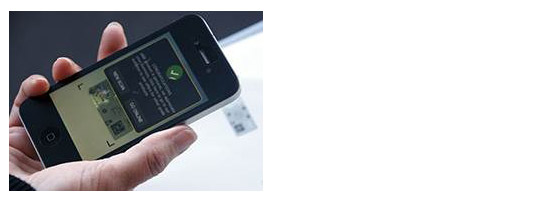
REALITY CHECK! Reaping the benefits of Authentication Apps
Security and authentication ‘apps’ are emerging onto the global market, enabling users to identify famous wine labels, confirm the integrity of spirits bottles, register electronic & consumer goods warranties, and automatically authenticate security documents etc. Examples of tailor-made authentication applications are increasingly diverse and multiplying rapidly.
The emergence of this new type of ‘app’ is of course directly linked to smartphone penetration levels, and the unprecedented evolution of smartphone technology and usage, which in turn is providing tremendous power to the users themselves. In 2014, users spent an average of 37 hours and 28 minutes just on smartphone applications (Nielsen 2014) – the only differences in time spent being the variations in application selection.
Authentication application development is varied, with several technologies coexisting: NFC chips, QR or proprietary barcodes, or indeed, Holograms. As a result, in the absence of existing industry standards, brand owners may therefore be reluctant to invest in authentication applications right now, questioning usage levels, possible ROIs and security issues.
To support brand owners make an informed decision about whether to make the leap into smart-app territory, Surys’ brand authentication experts have summarized the key benefits of deploying an Authentication Application:
1- Protection efficiency is directly linked to its usage level:
Empowering consumers, professionals and stakeholders to autonomously authenticate and control products via their smartphones means brands are multiplying brand controllers from thousands to billions – ensuring a market coverage that could never be achieved with traditional means and multiplying ROI.
2- The latest wireless technology:
Current smartphones are highly advanced technological products. With ultra-high definition cameras and power processors equivalent to the first American ‘super calculators’, they can authenticate and instill confidence in product authenticity and quality much faster and easier than any existing technology. Smartphone authentication apps provide a secure and intuitive way to control products for each and every stakeholder.
3- Market data at your fingertips:
In our big data era, every bit of information can be valuable and evaluated by companies. Applications are transformational tools collecting a vast amount of user data (providing real time statistics, collecting traceability information, product performance data) that depicts a precise picture of the market for brand owners.
4- Enhanced marketing & communications:
Applications allow brands to create a more intimate relationship with their stakeholders, gathering precise data on who and where they are. Brands can therefore tailor their communications, and more effectively market to selected target audiences.
In conclusion, despite an emerging and complex offer, the absence of any real standards and relatively unchartered user rates, authentication applications are opening the door to empowering consumers and professionals in active brand protection and should be considered in any future brand protection strategies. They provide multiple benefits, from expanding geographic brand protection coverage to harnessing the latest technology and gathering data to improve market research and boost consumer relationships.
Whether brands choose to integrate authentication applications into an existing marketing application or launch them independently, with a view to strengthening market protection and boosting consumer relationships, this turning point in brand protection marks one of the most interesting developments of the last decade in the brand protection solutions market. Watch this space!
Arnaud Bansard
